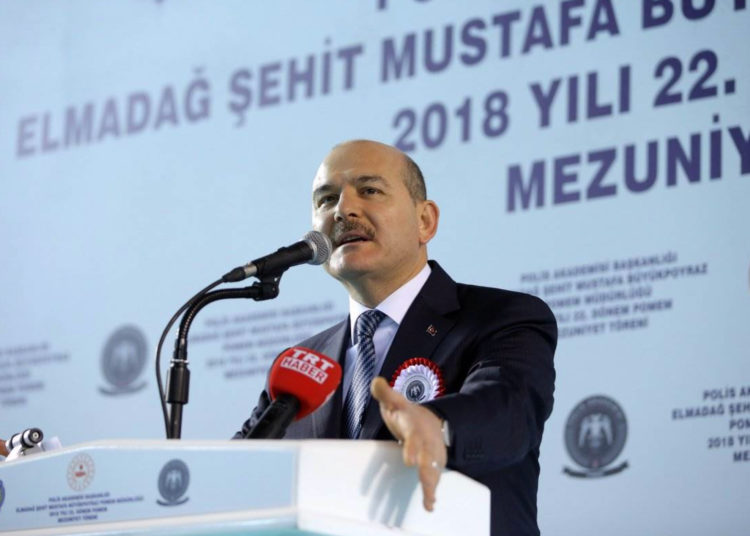In a clear violation of Turkish law as well as host country laws, the Turkish government has used police units deployed to Turkish embassies and consulates abroad for espionage activity, Nordic Monitor has learned.
A document sent to the court by the police department in Turkey exposed illegal espionage activity according to court papers reviewed by Nordic Monitor. Document number 9572 signed by the Intelligence Directorate of the Turkish National Police (Emniyet Genel Müdürlüğü İstihbarat Daire Başkanlığı) on January 6, 2016 listed the countries in which the police run surveillance on the Gülen movement, a group critical of the Turkish government.
The Ankara 4th High Criminal Court cited the document in its reasoned decision against movement members on Jan 16, 2019 in case No. 2016/238, confirming the authenticity of the document.
By law, the Turkish police are barred from collecting intelligence beyond Turkey’s borders. Only the National Intelligence Organization (MIT) is authorized to collect such information in foreign countries, while the police are allowed to gather information inside Turkey.

Moreover, the police deployed overseas in Turkish embassies and consulates were tasked with providing security for the missions’ buildings as well as for ambassadors’ residences. They were not authorized to collect information while assigned to protective duty for the embassy and attached buildings in the diplomatic compound.
In fact, the police officers who were deployed for what was described as “mission protection” overseas were temporarily placed under the employment of the Turkish Foreign Ministry. In other words, they were not listed as “police” per se on the diplomatic list, but both the sending and receiving states were familiar with who they were and what they did. Their main task was to coordinate with local law enforcement officials.
Depending on security needs, Turkish government deploys as many as a dozen police officers to a specific embassy. Some embassies require only one police officer. The selection is done through an oral interview conducted by the government. In 2017 Turkish authorities interviewed 1,350 police officers for mission protection duty, and 450 of them were selected on Jan. 10, 2018 for deployment to overseas missions in 110 countries.
Through the scandalous document, the Turkish court confirmed that the police run operations abroad in violation of Turkish law. The unlawful intelligence gathering must also run afoul of several legal codes in the host countries where the protective details were assigned.
Security experts who spoke to Nordic Monitor also underlined that the intelligence document shared with the court by the police department cannot be considered evidence, which is stated on the bottom of all such documents in line with the Code of Criminal Procedure (CMUK). The evidence must be collected only after the police receive authorization by the court under the supervision of a prosecutor’s office.
The countries in which Turkish police ran illegal surveillance operations were listed in the document as follows:
Nigeria, the United States, Malaysia, Latvia, Tanzania, Georgia, Senegal, Czech Republic, Switzerland, Mozambique, Mali, Australia, the United Arab Emirates, Russia, Philippines, Japan, Bangladesh, Kenya, Somalia, Lithuania, Libya, Burkina Faso, Austria, Germany, Hungary, Gabon, Mexico, Belgium, South Korea, Romania, Albania, India, Denmark, Ukraine, Sudan, Belgium, Morocco, Cambodia, Angola, Croatia, Canada, Egypt, Venezuela, Tajikistan, Mongolia, Ghana , Madagascar, France, Vietnam, Argentina, Sweden, Ivory Coast, Sri Lanka, Kyrgyzstan, Ecuador, Serbia, Bosnia and Herzegovina, Guinea-Bissau, Central African Republic, China, Chile, Uzbekistan, Kazakhstan, Kosovo, Thailand, Cameroon and Macedonia.
The Turkish police, overseen by the Interior Ministry, have a staff of 269,000. It was led by Süleyman Soylu, a close aide to Erdoğan. An unprecedented purge in the ministry paralyzed the police department, with 43,648 people purged without effective administrative or judicial probes. The purge took a real toll on the senior management of the police department, and the number of police chiefs has been reduced to 7,000 from some 21,000 since 2016, hampering the ability of the police to function effectively. Then move was seen as an attempt by the Erdoğan government to transform the police force into a his own private detective agency, with Ankara trying to justify the dismissals as a battle against the Gülen movement, a major critic of the Erdogan government.












